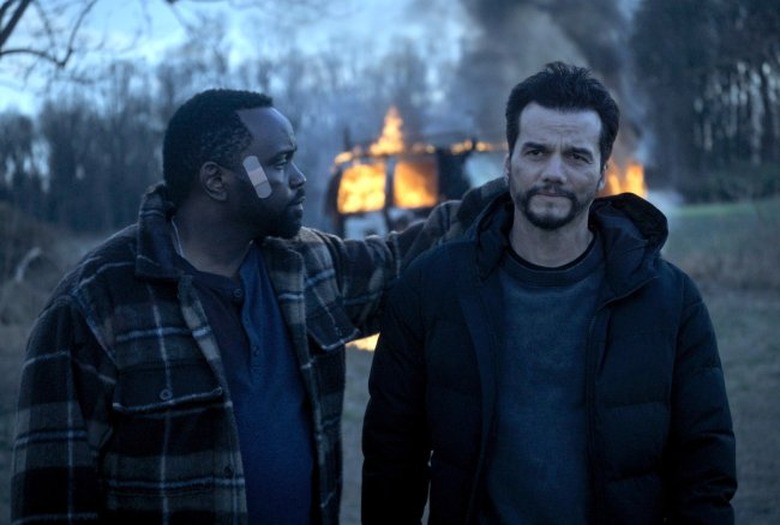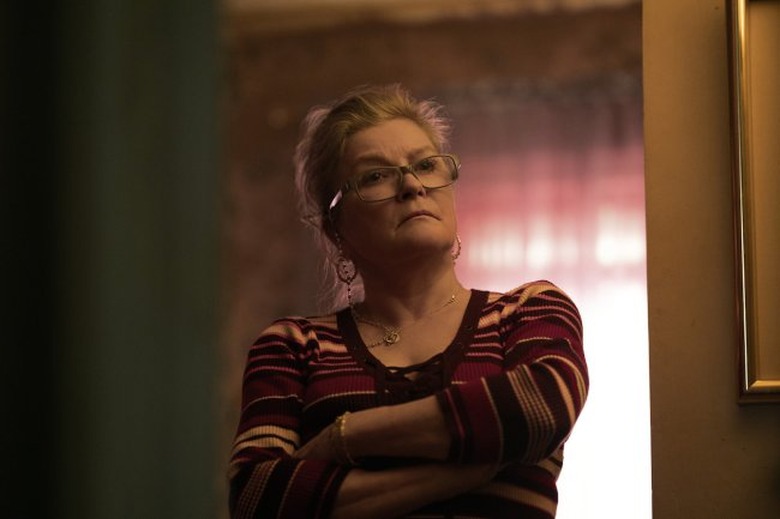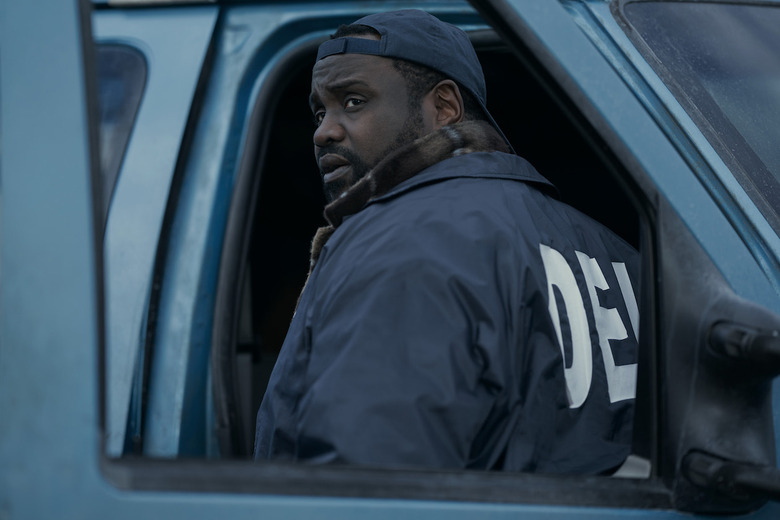We'd Die For Brian Tyree Henry's Dope Thief Character, Ray — And That's Exactly What He Was Going For
Within the first 10 minutes of Apple TV+'s Dope Thief, you fall in love with a character named Ray. He's a mess, he's made some poor choices, and he's about to go through with yet another that will change the trajectory of his life. But he's also funny and sweet, and played with incredible vulnerability by Atlanta alum Brian Tyree Henry. So, really? You never had a chance.
The new series begins streaming today and stars Henry and Wagner Moura (Narcos) as Ray and Manny, longtime friends in Philadelphia who pretend to be Drug Enforcement Administration officers in order to seize drugs and cash from small-time dealers. The hustle works... until they attempt to branch out and find themselves mired in an escalating drug war for which they are woefully unprepared.
Ray and Manny "are truly just two men trying to make it" after growing up in juvenile detention, Henry tells me during a call from London, where he's filming Sam Esmail's upcoming film Panic Carefully. "And for the most part, it's like, what does 'making it' on the outside look like? What does it look like when you release this creature to the world? I often think about it like prisons are kind of, they're torture chambers. They're like zoos," he says. "You're caging these living human beings and releasing them to the world, and [how do they] adapt? So that's what we really wanted to showcase, was the humanity of these two guys. But also, what happens when it all goes wrong?" He laughs. "Because it literally every episode all goes wrong."
The show is based on Dennis Tafoya's 2009 novel of the same name; Peter Craig (The Batman, Top Gun: Maverick) is series creator and showrunner. The cast also includes Kate Mulgrew (Orange Is the New Black), Ving Rhames (Pulp Fiction), Nesta Cooper (See) and Marin Ireland (Justified: City Primeval), and Ridley Scott (Gladiator) directed the series premiere. In addition to starring, Henry also is an executive producer.
Read on to hear what Henry has to say about the show's engrossing dark humor (read Dave Nemetz's review here), the circumstances that brought Ray to where we meet him in Episode 1 and the castmate who signs every text with her character's name.
TVLINE | I found myself laughing so often during the show, then saying to myself, "This is not funny! Bad things are happening!" But it is funny.
BRIAN TYREE HENRY | Yes!
TVLINE | There's so much dark humor there. Was the tone part of what drew you to wanting to do the show?
Absolutely. I mean, there are a lot of things that drew me to it, and the first was Peter Craig and Peter's writing. He just does such great development of character and creating of stories where the stakes are just incredibly f—king high. You walk away grateful that you're not the people that are in the world. [Laughs] It makes you go, "Oh OK, my choices are not that bad. OK, I'm good." And that was what was so appealing. And the other element was absolutely the comedy, the dark humor in a place where all the stakes are so incredibly dire. I loved the levity. When you come into the series, you come into it feeling like you know who these characters are already. There's a sense of kinship that Ray, Manny and everyone attached to them — you can feel it from the minute that each character is introduced on screen. I love stories like that, that share familiarity and don't hold back on it.

TVLINE | I went into the premiere episode cold, so I didn't know that Ray was posing as a DEA agent; I thought he was one. He has such a commanding presence, and seems to have things under control. You get the sense that, if situations and circumstances had gone left instead of right throughout his life —
— he could've probably been a DEA agent. Something of promise, yeah, could've been the thing for Ray. But unfortunately, the hand he was dealt, it's not. That's also what I love about this story is, everything is circumstantial, right? You have these two men, this Black and brown man, who have been in the system since they were 15 in a city like Philly... and they're raised in that, for lack of a better word, they're brought up in a system where you can't advance unless we tell you had to advance. And what's waiting for them on the other side? They're spit out into society and told, "You're men now. Here you go." And they're just like, "OK well where am I supposed to get a job? What am I supposed to do? How am I supposed to carve out some kind of living?" So they inevitably go back to what they know — or even what's easiest, which happens to be pretending to be DEA and robbing drug dealers.
But I think that there's even humor in that. With all the ingenuity it took them to get DEA jackets and hats printed, to find guns and badges and walkie-talkies, where would those efforts be better used? I think that's what so great about Peter, he always meets his characters with their backs against the wall and you're just always wondering, "What if they made this turn?" or "What if it's one wrong turn?" Because that's all it takes for all of us, right? Just one wrong turn, and well, here we are. That's where you find the land of Dope Thief.
TVLINE | Have you thought about what Ray's life looked like before we come into the series?
Oh, absolutely. I always love pointless deep dives on who these men are before I step into them. And I do crazy games, right? I'm always the one, like, "What's their zodiac sign? What's their favorite candy?" ... I like that kind of approach, because you humanize them... And then with Ray and Manny, especially, I'm going to tell you something right here and now: Wagner Moura is one of not just the best actors, but one of the best human beings I've ever met. So then when you get a chance to pour somebody like Wagner into a character like Manny, where they are these two men who are more than brothers, you meet them at a skewed love story. Because they were in prison together, they are all each other's had for a long time, they grew up together and they grew up under the system — like, literally, under the foot of the system. So there's this connection that only the two of them will ever know, this kindredness that only the two of them will know. You have a sense that Ray is the driving force of it. Ray is the alpha male in the relationship, but also that there is this tenderness and care that he truly has for Manny.
... Then you have these quiet moments when you see him going back to his apartment — which, let's be honest, he has his own place. Ray has his own place, his little fortress of solitude, the operative word being "solitude," because he is very much alone. There was something about that that I wanted to explore, because there's also this sense of childlike nature to the two of these guys. They're so bad at what they do! [Laughs]
TVLINE | We're so used to watching TV shows where the people involved in shootouts know what to do: grab the casings, get rid of the bodies or other evidence. But these two are normal guys who have no clue about all of that.
Yeah, nope. Not our Ray and Manny. What's also so crazy about it is all they've ever wanted to do is build a life of normalcy. It doesn't seem like, out of the duo, that one of them is willing to do that, which is definitely Ray. He's still confined to having his room in the attic of his mom, his foster mom. Everything in his life is a relic of the past. If you look at the posters on his wall. If you look at the clothing, the CDs. He's still kind of trapped and that's what Peter wanted to show in this series of what happens when you create this kind of mousetrap for a person when they never even knew the parameters were set that way. Ike, they can break the parameters, Philly is not that big of a city, but it's all he knows. And now he's gone and created his own trap by robbing the wrong house and having people come after him. It's all a comedy of errors. [Laughs] It feels kind of Shakespearean to me in that way. There's no true protagonist. Technically, there's no true protagonist in this. Everyone is kind of an antagonist in their own way, even if it is to themselves. But you end up rooting for them, and I love stories like that, where you technically aren't supposed to give a s—t about the guy. Like, "Aw man, what a piece of trash." Then you're like, "Oh wait, we actually love him. I hope he makes it. I hope he finds a place to sleep tonight."
TVLINE | In my notes for the first episode, I wrote "I would die for Ray."
Ahhhh! [Laughs]
TVLINE | You just want to root for him.
That's the best. Let that be the interview! [Laughs] Just write "I would die for Ray," and that's it. That's all I need.

TVLINE | I would die for Ray, but honestly, I'd also die for Theresa. Because Kate Mulgrew!
Isn't she the best? And what's really amazing about this show is that the relationship that we have as a cast is thick. Like, T-H-I-Q-U-E. We really love each other, and I am her son in real life now. I call her "Ma." She only signs her text messages "Ma" — with a shamrock, by the way, with a four-leaf clover just so you remember she's Irish, OK? But I love Kate Mulgrew and Theresa is just that broad, you know? They don't make them like her anymore. She's staunch, and she's hard, and she's unafraid of anybody. But at the same time, her devotion and her loyalty is thick, it runs deep. I love that. I love that any chance she gets, she calls me a "s—tbird." And it's our language, it's our thing, because she's been there for [Ray] since [he] was a child. And what does that mean for this Irish, white broad to take on this young, Black kid and hold this young, Black kid down, no matter what? It was really an amazing flavor that Peter and I wanted to explore when we were thinking about casting the mom. And Kate just is undeniable. She's so great.
TVLINE | This show moves so quickly — I feel like Ray lives 10 lives in the first two episodes. In your mind, how often do you think he thinks he's a goner?
I mean, you kind of meet him there. Technically, this [job] is supposed to be their last one. Every one is supposed to be their last one... Every episode is twists and turns, and "Is Ray gonna make it?" Truly.
